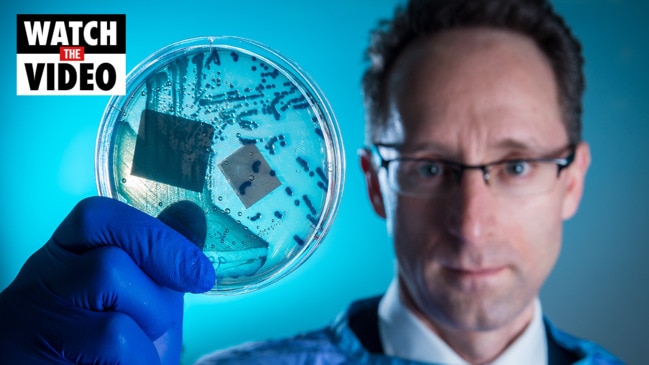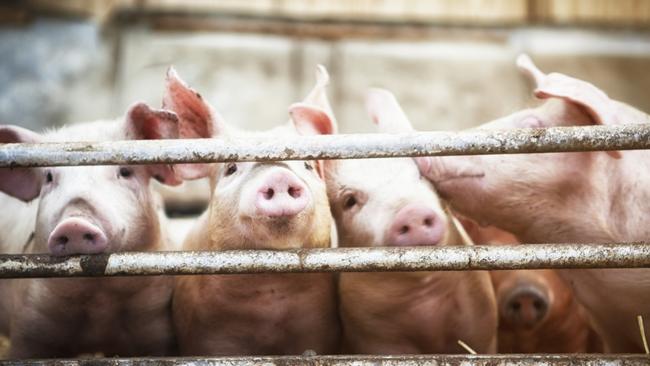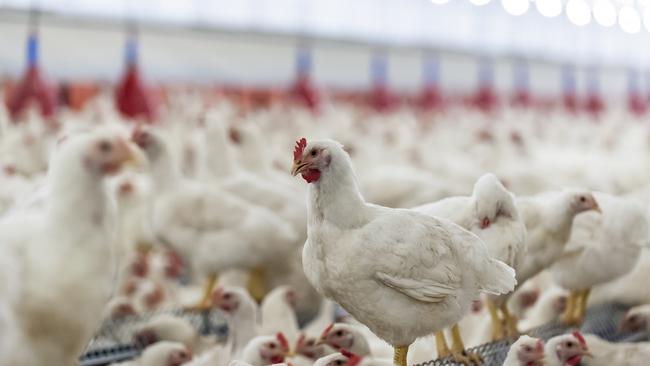Antibiotic use in farming is breeding drug resistant infections
Overuse of antibiotics in food production is breeding superbugs that are resistant to drug treatment and it could kill 10 million people a year by 2050 – and even vegans are at risk.

Illness
Don't miss out on the headlines from Illness. Followed categories will be added to My News.
Exclusive: Ten million people a year could die by 2050 from drug-resistant superbugs lurking in the food we eat.
Widespread, unnecessary antibiotic use in the farming process globally is breeding the bugs.
While Australia keeps a record of growth in antibiotic-resistant infections in humans, we do not actively monitor antibiotic use in food production.
Seventy per cent of the world’s antibiotics are used on factory farmed animals like pigs, poultry and fish, prompting the World Health Organisation to call for a complete ban to prevent disease in animals.
But even vegetarians and vegans are at risk from eating fruits and vegetables washed in water contaminated with antibiotic-resistant bugs bred in human and animal excrement, experts have warned.
A new survey has found more than eight in 10 Australians are in the dark about the true volume of antibiotics used on factory farmed animals such as pigs and chickens.
The same number think it is wrong to use antibiotics for disease prevention and to enhance growth in factory farming.

Over 15,700 people were surveyed across 15 countries in the poll conducted by Flood and Partners for World Animal Protection (WAP), including 1000 people in Australia.
WAP spokeswoman Kate Blaszak said already globally over 700,000 people a year were dying from antibiotic resistant infections.
The 2015 O’Neill report commissioned by the UK government found “as we move towards 2030-2050 we’re looking at, at least, 10 million people dying, a year every year and cumulatively that’s looking to be around 300 million people dying by 2050,” she said.
The biggest threat in Australia comes from imported foods because food production in Europe and Asia is more likely to use human use antibiotics in food production.
Australia is among world leaders in our antibiotic stewardship in agriculture ranking fifth out of 29 countries in responsible use.
Sydney University veterinary expert Stephen Page said unlike Europe, India and Asia most of the antibiotics registered for use in agriculture in Australia were not the type used against human pathogens so did not pose a risk.
“Over the last 10 years there’s been a revolution in farm practices to keep infection out – decreasing antibiotic use because it makes sense from the commercial point of view and is good for animal welfare too,” he said.
The meat industry said there were five antibiotics registered for use in beef cattle to promote growth but they were not the type of antibiotics used in humans.

The Australian Chicken Meat Federation said the Australian industry has been a global leader in antimicrobial resistance policies.
“Since 2017 under formal policies if antibiotics are to be used at all, they must only be used for therapeutic purposes (to treat, control or prevent disease), not for growth promotion,” said ACMF’s Executive Director Dr Vivien Kite.
“No antibiotics that have been determined by the World Health Organisation (WHO) to be critically important in human medicine are used routinely in chicken production.”
Murdoch University’s Sam Abraham has studied antibiotic resistance in Australian chickens and pigs and found very low rates of antibiotic resistant bugs.
There was a larger threat from seagulls where one in four birds carried antibiotic resistant bacteria, he said.
However, Chairperson of the Australian Group on Antimicrobial resistance Professor Geoff Coombs said: “We don’t have any really good surveillance data on microbial resistance in animals”.
A strategy signed off by state and federal leaders in March agreed this was a problem and warned “without effective infection prevention and control in human health, and biosecurity measures in animal health and food production, antimicrobial resistance would rise.”
Australian National University’s infectious diseases expert Professor Peter Collignon said: “The other issue is actually the environment because we’re not measuring what’s happening in our waterways and things like that, both with antibiotic residues but also with antibiotic resistant bacteria.”
He also acknowledged the threat from imported foods.
